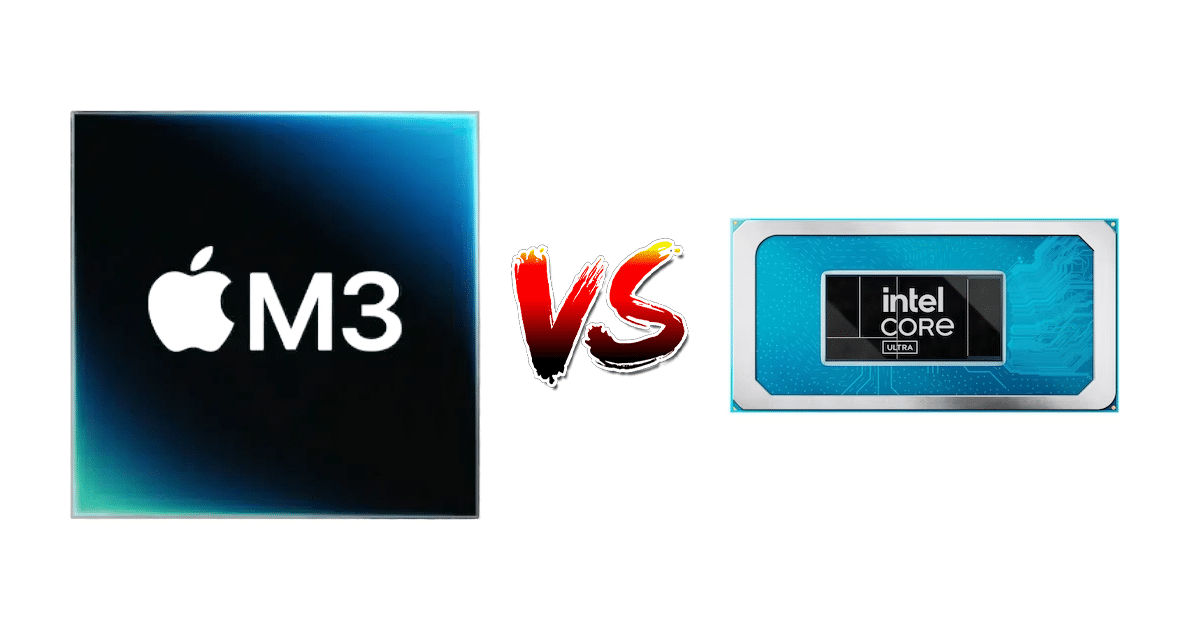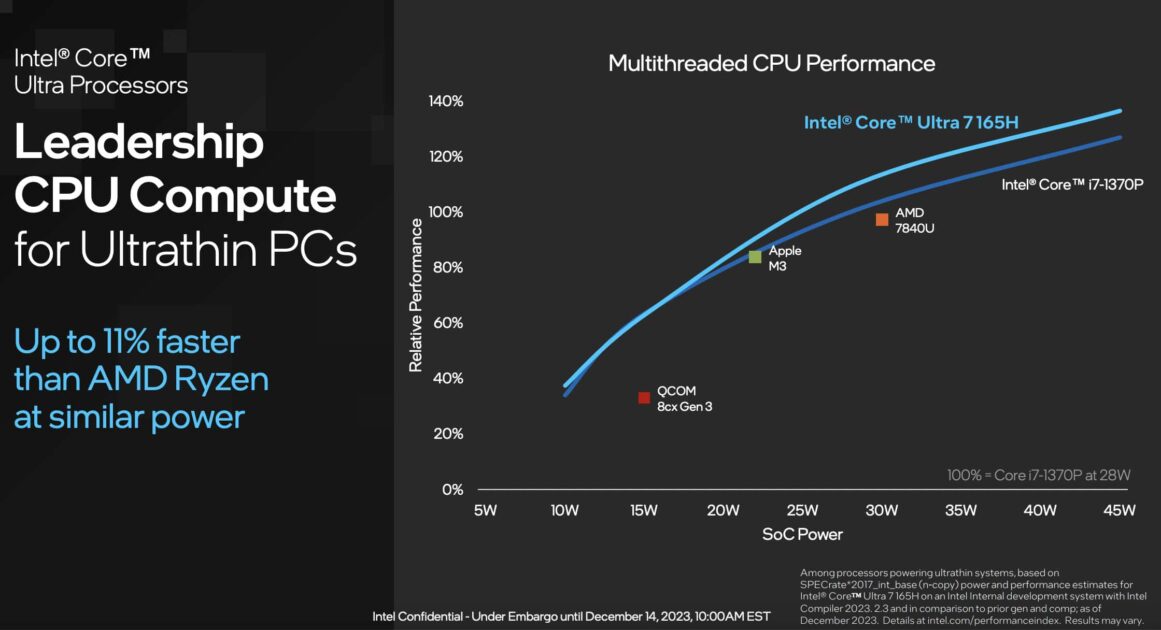The M3 chip series, launched in October 2023, represents Apple’s third generation of ARM-based processors that deliver a potent combination of efficient performance, outstanding battery life, and seamless integration with the macOS ecosystem.
Intel Core Ultra mobile processors are the latest generation of CPUs from Intel, aiming to power thin and light laptops with both top-tier performance and exceptional battery life.
Today, we’re taking a look at the most powerful processors on the market: Intel’s new Core Ultra mobile processors (codenamed Meteor Lake) and Apple’s M3 chip series. Both promise powerful performance and exceptional battery life, but which one reigns supreme? Let’s break down the key differences to help you choose the right chip for your needs.

Intel Core Ultra mobile processors vs. Apple M3 chip series: Feature comparison
| Feature | Intel® Core™ Ultra | Apple M3 |
|---|---|---|
| Architecture | Hybrid (2 P-cores + 8 E-cores) | Unified (custom ARM cores) |
| Performance | Strong multi-threading, competitive single-core (awaiting final benchmarks) | Outstanding single-core, potentially lower multi-core in demanding tasks |
| Power Consumption | Up to 25% reduction compared to previous Intel, claims 79% lower than AMD at same TDP | Renowned for exceptional battery life |
| Graphics | Intel Iris Xe integrated | Apple-designed GPU (good for everyday tasks and some gaming) |
| Software Compatibility | Wide compatibility with Windows and other PC operating systems | Limited to the macOS ecosystem |
| Price | Expected to be in premium laptops (higher price point) | Powers MacBook Air and base MacBook Pro models (generally more affordable than high-end Core Ultra laptops) |
| Target Users | Demanding multi-tasking workflows, Windows compatibility, future-proofing | Excellent battery life, macOS ecosystem, lightweight MacBook usage |
Intel Core Ultra mobile processors vs. Apple M3 chip series: Detailed comparison
Architecture
- Core Ultra: Intel takes a hybrid approach, packing two high-performance (P) cores for demanding tasks like video editing and gaming alongside eight efficient (E) cores for everyday browsing and document work. This design aims to deliver the best of both worlds: peak performance when you need it and impressive battery life when you don’t.
- M3: Apple sticks to its guns with a unified memory architecture, featuring custom ARM cores optimized for both performance and efficiency. This tight integration allows for seamless communication between different components, potentially resulting in smoother performance.
Performance
- Core Ultra: Early benchmarks show an 11% multi-threading performance improvement over competitors like AMD Ryzen 7 7840U and Apple M3. However, the single-core crown is still up for grabs, with final benchmarks awaited.

- M3: Apple’s chips are renowned for their outstanding single-thread performance, making them feel incredibly snappy for everyday tasks and creative applications. However, in complex multi-threaded workloads like video editing or 3D rendering, Core Ultra might take the lead.
Power Play
- Core Ultra: Intel boasts up to a 25% reduction in power consumption compared to previous generations and claims a whopping 79% lower power draw than AMD Ryzen 7 7840U at the same TDP. This translates to potentially longer battery life for your thin-and-light laptop.
- M3: Apple’s M3 chips are legendary for their battery efficiency. MacBooks powered by these chips consistently outperform most Windows laptops in terms of battery life, making them ideal for on-the-go warriors.
Beyond the Benchmarks
- Software Compatibility: Core Ultra offers wide compatibility with Windows and other PC operating systems, while M3 restricts you to Apple’s macOS ecosystem. Choose wisely based on your software needs.
- Price Tag: Expect Core Ultra laptops to be on the pricier side due to their premium positioning. M3-powered MacBooks, particularly the MacBook Air and base MacBook Pro, tend to be more affordable compared to high-end Core Ultra machines.
Which chipset is better suited for your needs?
M3
- Long battery life: You need a laptop that can last a full workday or longer without needing to be plugged in.
- Apple Ecosystem: You prefer the seamless integration and familiarity of the macOS ecosystem.
- Everyday tasks and light content creation: You need a machine that handles web browsing, document editing, and basic creative work efficiently.
- Value: You prioritize affordability and finding a laptop that offers the best features for your price point.
Core Ultra
- Power user: You require a laptop that can handle demanding multi-tasking and heavy workloads without breaking a sweat.
- Software compatibility: You prioritize compatibility with essential Windows programs and legacy software tools.
- Long-term value: You value future upgradeability and raw power to extend your laptop’s lifespan and tackle evolving needs.
- Gaming enthusiast: You crave high performance for smooth gameplay, immersive graphics, and a competitive edge in demanding titles.
Verdict
Choosing between Core Ultra and M3 comes down to your individual needs and priorities. If you’re a power user who juggles demanding multi-tasking workloads and values Windows compatibility, Core Ultra might be your champion. But if you prioritize exceptional battery life, a seamless macOS experience, and a potentially lighter wallet, the M3 could be your perfect match.
Remember, this is just the beginning of the story. As new benchmark results and real-world testing data emerge, the battle between the Core Ultra and M3 will undoubtedly heat up. Stay tuned for further updates.

